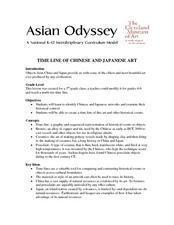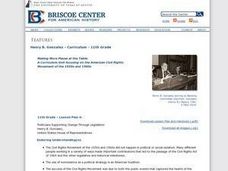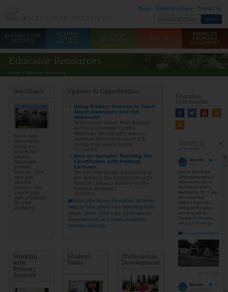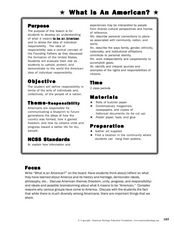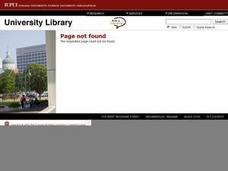Curated OER
Activity 10: Primary and Secondary Sources
Students sort documents into primary and secondary sources and analyze their reliability. In this history research activity, the teacher gathers a selection of document images, then discusses primary and secondary sources and their...
Curated OER
Amendment Process
Eighth graders examine the current amendments and discuss any change they would like to make. With a partner, they develop a proposal and an advertisement to redo at least two amendments. They also compare and contrast the amendments...
Curated OER
After the American Revolution: Free African Americans in the North
Eleventh graders explore how one-third of Patriot soldiers at the Battle of Bunker Hill were African Americans Census data also reveal that there were slaves and free Blacks living in the Nort
Curated OER
Trekking to Timbuktu: The Geography of Mali - Student Version
Eleventh graders locate Mali on a world map, describe the landscape and climate of Mali, and locate the city of Timbuktu and describe the local weather. They compare life along the Niger in ancient times to that of today
Curated OER
Trekking to Timbuktu: Timbuktu's Golden Age of Scholarship
Students access online information regarding education in Timbuktu and the mighty Songhai Empire. They write an essay comparing and contrasting the curriculum of the university at Sankore with that of their own school.
Curated OER
Female Fur Traders: Breaking Arbitrary Barriers
Eighth graders read a variety of articles and watch a video about the history of female Canadian fur traders. They contribute to a website on the subject and develop a presentation with their research for the class.
Curated OER
Time Line Of Chinese And Japanese Art
Learners create individual time lines placing various works of Asian art into chronological order. The information gathered is used to create one class time line for display.
Curated OER
Sources of Information
Young scholars review information from a previous lesson plan about JFK and his assassination. As a class, they identify sources they believe historians use and describe the difference between a primary and secondary source. In groups,...
Curated OER
Trekking to Timbuktu: Timbuktu's Golden Age of Scholarship
Middle schoolers study and identify the empire of Songhai through research and describe Timbuktu's role in its economy. They investigate how Timbuktu became an important spiritual and intellectual center of Islam. Students describe the...
Curated OER
Making More Places at the Table: The American Civil Rights Movement of the 50's and 60's
Eleventh graders examine the biography of Henry B. Gonzalez. They examine primary source documents from Congressman Gonzalez's personal papers related to his contributions to the Civil Rights Movement.
Curated OER
Artists as Explorers
Students brainstorm a list of famous explorers from the past. In groups, they complete a worksheet analyzing the art of Karl Bodmer and how one could view him as an explorer as well. They answer discussion questions to end the lesson plan.
Curated OER
Miao Minorities
Middle schoolers conduct Internet research to identify the cultural aspects of the Miao minority group from China. They, in groups, create a brochure with their research and write an essay on the predicted future of the Miao culture.
Curated OER
What Does Korean Literature Reveal About War?
Students are exposed to a wide variety of war related literature in order to comprehend the influence of conflict upon the lives of the Korean people. The information is used to complete a research report.
Curated OER
Bill of Rights -- Texas v. Johnson, 1989
Students examine the First Amendment of the Bill of Rights. During a visit to the George Bush Presidential Museum, they watch a video about the Texas v. Johnson flag burning case. In groups, they discover the role of the Supreme Court...
Curated OER
To Vote or Not To Vote
Ninth graders discuss if it was worth some groups fighting for the right to vote. In groups, they participate in a debate in which they discuss whether the right to vote is a responsiblity by its members. They create their own piece of...
Curated OER
Eye of the Icon
Students examine various examples of artwork and identify icons. In groups, they discuss the role of special interest groups and media in promoting icons in society. They create a bust of an icon in the Victorian style and share them...
Curated OER
Constitutional Issues: Separation of Powers
Students discribe the principle and the history of separation of powers.
Curated OER
Before It Was Wisconsin-Rock Art
Students examine how archaeologists make use of all forms of artifacts including rock art to try to piece together past cultures. They make their own rock art so they have a feel for how such pieces were made out of natural materials.
Curated OER
What is an American?
Students investigate how the definition of being American has changed over the years using online primary source documents.
Curated OER
The "Me" Exhibit
Students collects artifacts from home that they feel describe themselves. They write captions for each artifact and display them for their classmates.
Curated OER
A Proper Role for Government - Seeking Perfection in an Imperfect World
Students discuss the proper role of government in the economy. Reviewing the foundations for a market economy to work properly, they decide how to best direct resources to get the most out of them. They distinguish between private and...
Curated OER
Studies of the Eastern Worlds: Cultural Maps
Seventh graders look for similarities and differences in the culture of Eastern World countries by looking at the art from each country. They test their hypothesis and assumptions through further research in the media center. Finally...
Curated OER
The Study of the Spanish-Speaking People of Texas: Understanding Primary Sources
Students analyze Russell Lee's photo essay as a sign of segregation in Texas. They consider the differences between primary and secondary sources and how historians use these sources.
Curated OER
United Nations
Students conduct a fact-finding mission about the United Nations on the internet. They compile the information from all students on a class graphic organizer then break into small groups to analyze which part of the United Nations would...








